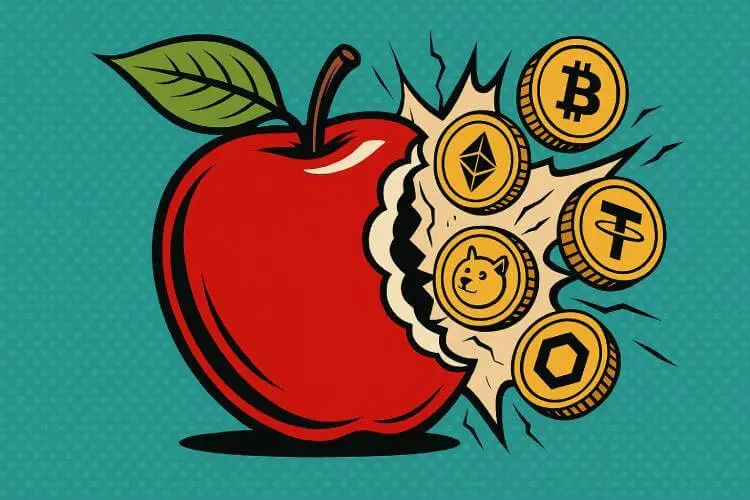Apple Forced to Ease App Store Rules as Crypto Apps Gain Ground


A major legal ruling in the United States has dealt a serious blow to Apple’s longstanding dominance over App Store payments. On April 30, 2025, a U.S. federal court found Apple in willful violation of a 2021 injunction that aimed to reduce its anticompetitive behavior. The court ordered Apple to immediately allow app developers to direct users to alternative payment methods, rather than forcing them to use Apple’s own system, which comes with a steep 15% to 30% commission.
The decision comes as the result of Apple’s drawn-out legal battle with Epic Games, the developer behind Fortnite, which originally challenged Apple’s rigid payment rules in 2020. The new ruling significantly impacts how apps, especially in the crypto space, can operate on iOS. Developers can now offer iPhone users lower-cost options and greater flexibility without being penalized by Apple's commission structure.
Breaking Apple's Grip on In-App Payments
Until now, Apple has maintained strict control over all in-app purchases made through iOS apps. Developers weren’t allowed to link to external payment platforms and were forced to process all transactions through Apple’s system, giving the tech giant a sizable cut of every purchase.
This model has drawn criticism for years, particularly from developers of high-value digital apps such as NFT marketplaces, decentralized exchanges (DEXs), and crypto wallets. These platforms typically handle larger transactions, and Apple's 30% cut was often seen as an unfair “tax” that hindered growth and innovation.
Judge Yvonne Gonzalez Rogers, who presided over the case, clarified that these restrictions were no longer acceptable. Her decision states that developers are now free to implement buttons and links that direct users to outside payment options, putting an end to Apple’s exclusive claim over iOS app monetization.
A Major Breakthrough for Crypto App Developers
This is more than just a legal win for crypto app developers: it’s a long-awaited shift that opens new doors. Previously, platforms like OpenSea could list NFTs and display prices, but they couldn’t allow users to buy them through an external link. Doing so would have violated Apple’s rules and risked removal from the App Store.
Now, developers can integrate direct paths to DeFi platforms, NFT marketplaces, crypto purchases, and other Web3 services without jumping through Apple’s hoops. The ability to bypass the App Store’s fee structure means that smaller developers can also compete on a more level playing field, as they won’t have to give up a third of their revenue to Apple just to process a transaction.
Users Also Benefit from the New Rules
It’s not just developers who benefit; users also stand to gain. Crypto apps will now be able to offer better pricing, more functionality, and faster access to blockchain services. If someone wants to buy an NFT or interact with a DeFi protocol, they can now be taken directly to an external payment page rather than staying within a tightly controlled in-app purchase system.
This shift also opens doors for crypto-based entertainment apps. Whether it’s a blockchain wallet, NFT gallery, or even mobile crypto casinos, users will now face fewer barriers when accessing these services on iOS.
This should lead to lower fees, quicker transactions, and a smoother user experience. Many crypto platforms have already said they plan to roll out new mobile features now that Apple’s restrictions are lifted. Wallet apps, NFT galleries, and token swap interfaces will likely become more powerful and accessible on iOS.
Apple’s Quiet, Cautious Response
Despite the ruling's clear language, Apple hasn’t exactly welcomed the decision. The company has updated its App Store policies to comply with the court order, but industry observers say the tone of the announcement was reluctant and unclear. Ariel Michaeli, CEO of Appfigures, commented that Apple’s revised guidelines were vague and could cause confusion among developers trying to take advantage of the new freedoms.
This isn’t the first time Apple has faced criticism over its approach to crypto. In 2023, a class-action lawsuit accused it of blocking peer-to-peer crypto payments. A former App Store director even alleged that Apple viewed cryptocurrency as a “Ponzi scheme” and was generally biased against blockchain apps.
While the new court ruling forces Apple to adjust, the company will unlikely give up control without a fight. Analysts expect Apple to appeal the decision or look for other ways to enforce its influence under the banner of “user safety” or “platform security.”
A Turning Point for Web3 on Mobile
This legal shift marks a turning point not only for Apple but also for the mobile crypto ecosystem as a whole. For the first time, iOS developers have the legal backing to integrate fully functional Web3 services into their apps without fearing Apple's retaliation.
Developers can now apply to build wallets, NFT platforms, and DeFi tools that interact with the broader blockchain ecosystem, without being subject to Apple’s review of every payment method. While the average iPhone user may not feel the changes immediately, the long-term effect will be significant. Lower costs, greater app functionality, and improved access to crypto services will gradually become the new normal.
As crypto markets continue to evolve, so will the mobile platforms supporting them. And while Apple may still try to maintain some control, the days of unchecked power over app monetization appear to end.
Was this article helpful?
